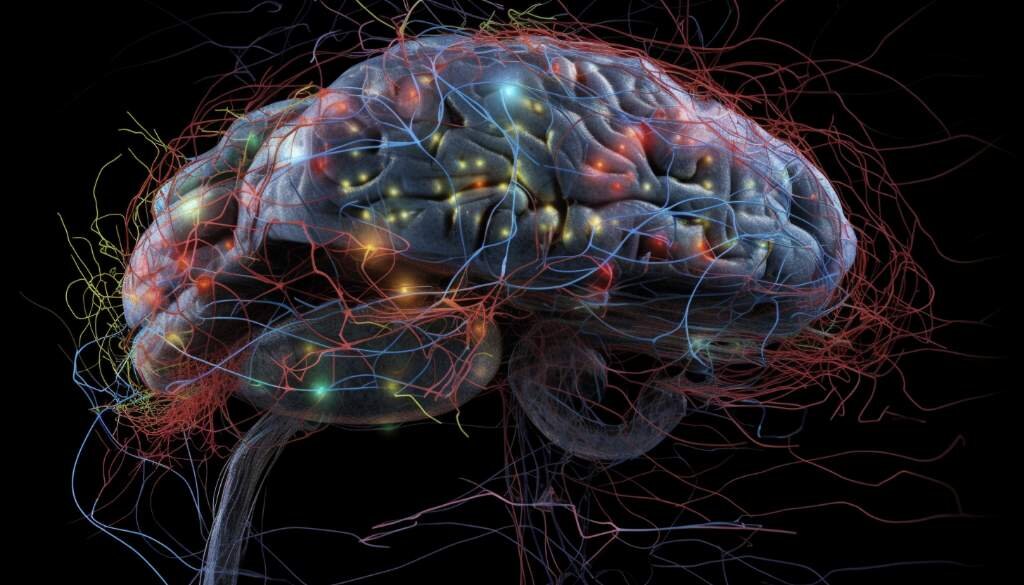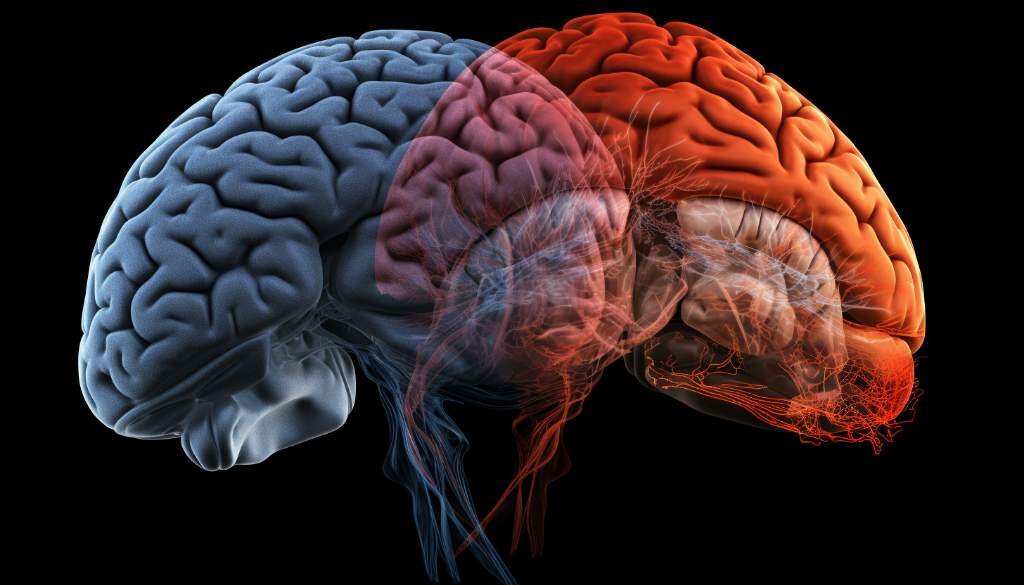
Introduction
An Introduction provides a brief overview and sets the stage for the upcoming sections. In this section, we will explore the relationship between testosterone and aggression, as well as its impact on the brain. We will dive into the factors influencing basal testosterone levels and the effects it has on aggressive behavior. Additionally, we will uncover the mechanisms through which testosterone affects the brain and its role in the development of neural circuits associated with aggression.
Overview of Testosterone and Aggression
Testosterone is a hormone that plays a crucial role in many aspects of human behavior, including aggression. In this sub-section, we will provide an overview of the relationship between testosterone and aggression.
Aggression refers to behavior that is intended to cause harm or pain to others. It can manifest in various forms, such as physical violence, verbal abuse, or dominance displays. Testosterone has long been implicated as a key factor in aggressive behavior.
Research has shown that there is a positive correlation between testosterone levels and aggression in both men and women. Higher levels of testosterone have been associated with increased aggressive tendencies, while lower levels are linked to less aggressive behavior.
However, it is important to note that testosterone alone does not determine aggression. There are various other factors that influence the relationship between testosterone and aggression.
One important factor is the individual's basal testosterone levels. Basal testosterone refers to the testosterone levels that are present in the body at rest, without any specific stimuli. Studies have shown that individuals with higher basal testosterone levels tend to exhibit more aggressive behavior than those with lower levels.
Several factors can influence basal testosterone levels. One such factor is genetics. Research has shown that there is a heritable component to testosterone levels, which means that individuals may inherit their basal testosterone levels from their parents.
Another factor that can influence basal testosterone levels is age. Testosterone levels tend to be higher during adolescence and early adulthood, and then gradually decline with age. This suggests that age-related hormonal changes may play a role in the development and expression of aggressive behavior.
It is important to note that testosterone's impact on aggression is not limited to these biological factors. Social and environmental factors, such as upbringing, cultural norms, and socialization, also play a significant role in shaping aggressive behavior.
In conclusion, testosterone is closely linked to aggression, with higher levels of testosterone generally associated with increased aggression. However, the relationship between testosterone and aggression is complex and influenced by various factors. Understanding these factors can provide valuable insights into the mechanisms underlying aggressive behavior.

The Link between Basal Testosterone and Aggressive Behavior
The link between basal testosterone and aggressive behavior refers to the relationship between the hormone testosterone and aggressive tendencies in individuals. Testosterone is a hormone that is present in both males and females, although males typically have higher levels. It plays a crucial role in the development and maintenance of male reproductive tissues and characteristics, as well as influencing various physiological processes.
In this section, we will explore the factors influencing basal testosterone levels and the effects of basal testosterone on aggression. Additionally, we will delve into the impact of testosterone on the brain, including the understanding of its mechanisms and the neural circuits associated with aggression. Furthermore, we will discuss the influence of testosterone on brain development.
Factors Influencing Basal Testosterone Levels
Factors influencing basal testosterone levels play a crucial role in understanding the link between testosterone and aggressive behavior. These factors can vary from individual to individual and can be influenced by various biological and environmental factors.
One of the primary factors that influences basal testosterone levels is age. Testosterone levels tend to be higher in males during adolescence and early adulthood and gradually decline with age. Studies have shown that peak testosterone levels occur around the age of 20 and gradually decline by 1-2% per year after the age of 30.
Another factor that impacts basal testosterone levels is genetics. Research suggests that there are genetic variations that can affect testosterone production and metabolism, leading to individual differences in testosterone levels. Variations in genes involved in the production and action of testosterone, such as the androgen receptor gene, can influence testosterone levels.
Diet and lifestyle choices also play a significant role in basal testosterone levels. Adequate nutrition, particularly consuming sufficient levels of zinc, vitamin D, and healthy fats, can support optimal testosterone production. On the other hand, a poor diet, excessive alcohol consumption, and obesity have been linked to lower testosterone levels. Exercise and physical activity are also important factors, as regular exercise has been shown to increase testosterone levels.
Stress can have a significant impact on basal testosterone levels. Chronic stress, such as work-related stress or relationship issues, can lead to elevated cortisol levels, which can suppress testosterone production. Managing stress through techniques like meditation, relaxation exercises, and proper sleep can help maintain adequate testosterone levels.
Social factors, such as dominance and competition, can also influence basal testosterone levels. Research has shown that winning in competitive situations can lead to increased testosterone levels, while losing can result in decreased testosterone levels. Furthermore, social interactions and relationships can affect testosterone levels, with studies suggesting that being in a committed relationship can lead to lower testosterone levels compared to being single.
Effects of Basal Testosterone on Aggression
In this sub-section, we will explore the effects of basal testosterone on aggression. Testosterone, a hormone primarily produced in the testes in males and ovaries in females, plays a significant role in several physiological processes, including the regulation of aggression.
Research has consistently shown a positive relationship between basal testosterone levels and aggressive behavior. Basal testosterone refers to the level of testosterone present in an individual's bloodstream at rest, without any stimulation or external factors influencing its production.
One of the key effects of basal testosterone on aggression is its ability to increase the likelihood of aggressive behavior. Studies have indicated that higher levels of basal testosterone are associated with greater aggression in both males and females. Elevated basal testosterone levels have been linked to increased dominance, competitiveness, and a higher propensity for physical aggression.
Another important effect of basal testosterone on aggression is its impact on social behavior. Higher levels of testosterone have been found to promote assertiveness and drive individuals to pursue social dominance. Individuals with increased basal testosterone levels may exhibit more dominant behaviors, such as engaging in competitive social interactions, seeking social status, and displaying territorial behavior.
However, it is essential to note that the effects of basal testosterone on aggression are not solely determined by hormone levels. Various factors can influence the relationship between testosterone and aggression, such as individual differences, context, and the presence of other hormones, including cortisol and oxytocin.
Furthermore, the effects of basal testosterone on aggression are not uniform across all individuals. Research suggests that individual variability in sensitivity to testosterone may exist, meaning that different individuals may respond differently to similar levels of basal testosterone. Genetic factors, environmental influences, and socialization can also shape an individual's aggressive tendencies.
Overall, the effects of basal testosterone on aggression are complex and multifaceted. While higher levels of basal testosterone are generally associated with increased aggression and dominance-related behaviors, it is important to consider individual differences and the interplay of various factors in determining an individual's aggressive tendencies.

Testosterone's Impact on the Brain
Testosterone's Impact on the Brain is a fascinating and complex topic that explores the relationship between the hormone testosterone and the brain. Testosterone, a steroid hormone primarily produced in the testes for males and in the ovaries and adrenal glands for females, has long been associated with several physiological and behavioral effects.
Research has shown that testosterone exerts significant influences on the brain, particularly in relation to aggression. This section will delve into the mechanisms through which testosterone impacts the brain and how it contributes to aggressive behavior.
Subsequent subsections will further explore these mechanisms and shed light on the specific neural circuits associated with aggression, as well as the impact of testosterone on brain development.
Understanding the Mechanisms
Testosterone's impact on the brain involves understanding the mechanisms by which this hormone affects neural pathways and functions. These mechanisms play a crucial role in shaping aggressive behavior and related psychological processes.
Research has identified several mechanisms through which testosterone influences the brain:
- Gene expression: Testosterone affects gene expression patterns in various brain regions involved in aggression. It regulates the expression of certain genes that are associated with aggression and related behaviors.
- Neurotransmitter systems: Testosterone modulates the activity of neurotransmitter systems, such as dopamine and serotonin, which are implicated in aggression. It can enhance dopaminergic activity in certain brain regions, leading to increased motivation and reward sensitivity that may contribute to aggressive behavior.
- Neuroplasticity: Testosterone has neuroplastic effects on the brain, influencing the growth, structure, and connectivity of neurons. It promotes synaptogenesis, dendritic branching, and neural circuit formation, which may shape the development of aggression-related neural pathways.
- Hormonal interactions: Testosterone interacts with other hormones, such as cortisol and oxytocin, to influence aggression and aggression-related behaviors. These hormonal interactions can modulate stress responses and social bonding, which are intertwined with aggressive tendencies.
In summary, the mechanisms by which testosterone impacts the brain involve gene expression, neurotransmitter systems, neuroplasticity, and hormonal interactions. Understanding these mechanisms is essential for comprehending the complex relationship between testosterone and aggression.
Neural Circuits Associated with Aggression
Testosterone's impact on the brain goes beyond just influencing aggression. It also plays a role in shaping neural circuits associated with aggressive behavior. These circuits are complex networks of interconnected brain regions that work together to regulate and control aggression. Understanding the neural circuits associated with aggression can provide valuable insights into the physiological mechanisms underlying aggressive behavior.
One key brain region involved in aggression is the amygdala. The amygdala is responsible for processing emotions, including fear and anger, and plays a crucial role in initiating and modulating aggressive responses. Research has shown that testosterone can directly affect the activity of the amygdala, enhancing its response to threat and increasing aggression.
Another important brain region associated with aggression is the prefrontal cortex. The prefrontal cortex is involved in inhibitory control and decision-making processes. It acts as a regulator of aggressive impulses, helping to inhibit aggressive behavior when it is not appropriate. Studies have found that testosterone can influence the functioning of the prefrontal cortex, impairing its inhibitory control over aggressive tendencies.
Furthermore, the hypothalamus, a small region in the brain responsible for regulating hormonal secretion, also plays a role in aggression. Testosterone interacts with the hypothalamus, triggering the release of other hormones and neurotransmitters that can further enhance aggressive behavior. The hypothalamus acts as a central command center, coordinating various physiological responses associated with aggression.
Overall, the neural circuits associated with aggression involve a complex interplay between different brain regions, including the amygdala, prefrontal cortex, and hypothalamus. Testosterone influences these circuits, modulating their activity and contributing to aggressive behavior. Understanding these neural mechanisms can help shed light on the underlying physiological processes involved in aggression.
Impact of Testosterone on Brain Development
The impact of testosterone on brain development is a key area of research that has garnered much attention in recent years. Studies have shown that testosterone plays a crucial role in shaping the developing brain, particularly during puberty.
During adolescence, the brain goes through a period of significant reorganization and remodeling. One of the hormones that drives these changes is testosterone. Testosterone is known to affect the growth and connectivity of neural circuits, leading to long-lasting effects on brain structure and function.
Research has shown that testosterone has a masculinizing effect on the brain, promoting the development of male-typical characteristics. For example, testosterone influences the growth of certain brain regions, such as the amygdala and hippocampus, which are involved in emotional regulation and memory formation.
Furthermore, testosterone has been found to influence the development of social behaviors. Studies have shown that individuals with higher levels of testosterone during adolescence display more aggressive and dominant behaviors, which can be attributed to the effects of testosterone on the brain.
Interestingly, the effects of testosterone on brain development are not limited to adolescence. Research has also shown that testosterone continues to shape the brain throughout life. In adulthood, testosterone is involved in maintaining brain health and function. Low levels of testosterone have been associated with cognitive decline, mood disturbances, and an increased risk of neurodegenerative diseases.
Overall, the impact of testosterone on brain development is an important area of research that has far-reaching implications. Understanding the mechanisms by which testosterone affects the brain can provide insights into the development of targeted interventions for various neurological and psychiatric conditions.








